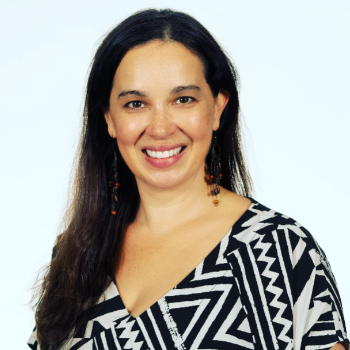
Christina Marea, an assistant professor in the School of Nursing and a faculty fellow at the Center for Social Justice, advocated for reproductive equity and safe child-rearing environments in a seminar hosted by the Health and Public Interest master’s program Sept. 18. The seminar, titled “Operationalizing Reproductive Justice in Health Services Research and Policy To Address Perinatal Health Disparities,” focused overall on addressing inequalities in reproductive health outcomes.
Marea noted reproductive justice can only be achieved through a multifaceted approach that includes broadening access to green spaces, clean air and water, adequate nutrition, health care providers and necessary medications.
“Reproductive justice involves the social and economic environments in which we live,” Marea said at the event. “It involves the ability to have care be delivered in a way that is respectful, engaging and welcoming — and not begrudging, biased and discriminatory.”
When these essential needs are not equally accessible to all, health disparities emerge. For example, roughly 45% of people in the Anacostia neighborhood, located in Ward 8, have high blood pressure compared to about 20% of people in the Georgetown neighborhood in Ward 2. According to 2017 data from DC Health, Ward 2 was able to meet seven times the demand for primary care relative to Ward 8.
Marea emphasized the importance of examining racism’s role in perpetuating poor health outcomes. Furthermore, she outlined three levels of racism: institutional, interpersonal and internalized. Marea explained that each of these levels act as a stressor, potentially leading to health-risking behaviors such as missing regular doctors’ appointments.
“Those behaviors don’t happen in a vacuum,” Marea said. “An individual doesn’t simply decide to engage in riskier behaviors or fewer protective-type behaviors. That’s deeply informed by the living conditions, the social environment, the family environment, the political environment in which they’re existing.”
Marea also said some institutional policies are particularly burdensome for groups with reduced access to resources. For example, policies to cancel appointments when patients are more than fifteen minutes late disadvantage those who rely on public transport, do not receive paid sick leave or lack access to child care.
According to Marea, health disparities in the Washington, D.C. area were exacerbated by the 2017 closure of the obstetric ward at United Medical Center, the only full-service hospital in Southeast D.C. She noted such closures disproportionately affect patients who are uninsured or have limited English proficiency.
“Is it meaningful access when we have hospital closures, facility closures — even in a city like Washington, D.C. where in theory we have five hospitals, but they’re not equally accessible?” Marea asked.
Even if one has access to care, the quality of this care is also influenced by systemic discrimination. Marea’s research revealed many new mothers do not return for postpartum care once the social pressure to seek prenatal care subsides after birth. This reluctance often stems from their past experiences of structural dismissal and suboptimal treatment within the health care system.
“The health care system is often an unwelcoming and unsafe place,” Marea said. “A significant proportion of Black birthing people are mistreated during their delivery, admission and birth.”
Marea said a critical investigation of data must be undertaken to improve future care. The D.C. Maternal Mortality Review Committee (MMRC) — an organization of physicians, doulas, midwives, pediatricians and community members — analyzes maternal mortalities that occurred during or within a year of pregnancy, identifies contributing factors and makes recommendations to prevent similar deaths in the future.
A key aspect of the MMRC’s approach is life course analysis. This method involves examining factors beyond the immediate circumstances of death, including the patient’s comprehensive medical history, childhood experiences and access to housing support, among other social determinants of health.
“Housing justice is reproductive justice, and right now this is an important area for advocacy within our city,” Marea said.
In addition to data analysis, outreach initiatives like Community of Hope, which Marea works for, can also advance health equity. The organization provides continuity of care, transportation, early childhood and postpartum home visits by providers, breastfeeding support and maternal and baby supplies. Their mission is to “ensure equity for all Washingtonians regardless of their neighborhood.”
Bilquisu Abdullah (CAS ’25) said the talk provided a crucial lens through which to examine and improve our healthcare system.
“Talks like this should be at the forefront of health access and policy dialogue,” Abdullah wrote to The Hoya.
Underpinning these efforts is the stark reality that, according to Marea, the maternal mortality rate among Black birthing individuals is three to four times higher than that of their white counterparts. She emphasized merely acknowledging the higher risk that marginalized groups face is not enough.
“The health care system, the social system, needs to do a better job of protecting,” Marea said. “We are systematically failing them in ways that are visible, that are preventable and that are not a secret, not a surprise.”


